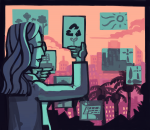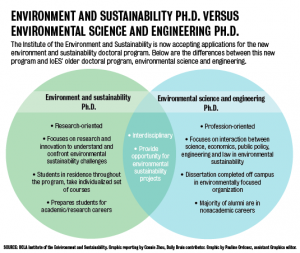Students can now apply for a new doctoral program that aims to provide a more interdisciplinary approach to environmental sustainability.
The UCLA Institute of the Environment and Sustainability’s environment and sustainability Ph.D program is a research-oriented program starting in fall 2018 that allows students to develop customized programs and courses to develop their knowledge and conduct research in environmental sustainability. Applications for the program opened last week.
Edward Parson, a professor in the UCLA School of Law and co-director of the new doctoral program, said that unlike many other doctoral degrees, this program will help students understand sustainability problems through multiple disciplinary perspectives.
Parson added the institute created the doctoral program to better understand how sustainability problems evolve and how to come up with solutions to address them.
Students in the program will choose two primary advisors from two distinct fields that meet their research interests, said Cully Nordby, academic director of the Institute of Environment and Sustainability.
Nordby added during the first year in the program, students will take a two-quarter core sequence in which they will study environmental case studies using different academic approaches.
Students will then enroll in research method courses to plan out their research dissertations, she said.
Ursula Heise, chair in literary studies in the department of English and the Institute of Environment and Sustainability, said doctoral students in the program will be able to explore environmental issues from scientific and technical perspectives.
“(Students) will also have (an) in-depth understanding of these issues as cultural and political issues,” she said.
Heise said most graduate and undergraduate programs in environmental science nationwide were created in the 1960s and are limited in their interdisciplinarity.
“(These programs) include various science disciplines, (which) sometimes include some types of engineering. In some rarer cases, they include environmental law and policies,” she added. “But it is rare to include qualitative social science and humanities courses.”
Heise said that for the new program, the institute’s professors designed courses that would encourage students to study environmental sustainability problems using knowledge from disciplines distinct from environmental science, such as cultural studies and anthropology.
Students applying to the program will be able to pursue research careers in various fields such as academia, business or nonprofit, Nordby said.
“Possibilities are open; (this program is) more for people interested in research … but they can essentially go in a variety of directions (with) this degree,” she said.

